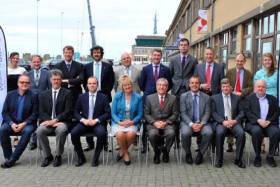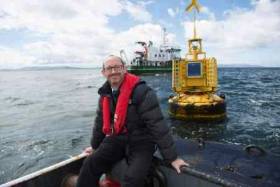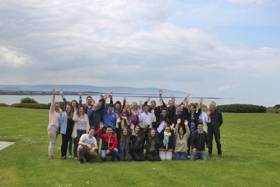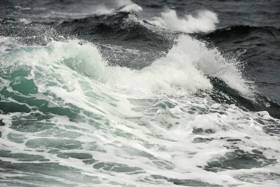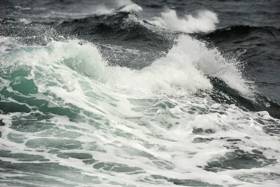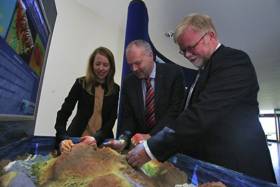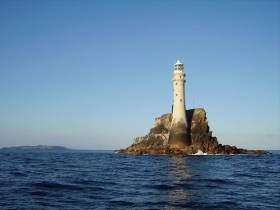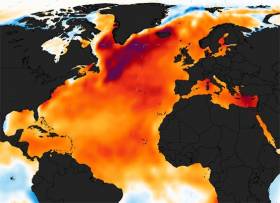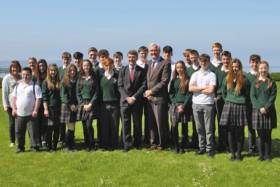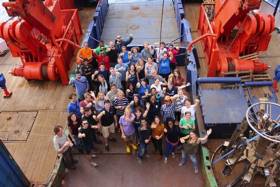Displaying items by tag: marine science
#MarineScience - Marine Institute chief executive Dr Peter Heffernan was among the heads of European marine science institutes meeting with Karmenu Vella, EU Commissioner for Environment, Maritime Affairs and Fisheries, at the European Marine Board offices in Ostend, Belgium yesterday (Friday 8 July) to discuss ocean research priorities and challenges.
The meeting with Commissioner Vella follows a previous consultation attended by Dr Heffernan in March, which identified ocean observation and seabed mapping as crucial for managing human activities in European seas and across the global ocean.
The European Marine Board said the latest meeting will advance the discussion on ocean observing and seabed mapping in Europe, set within a global context, by identifying critical gaps in our capability, investment needs and potential funding sources for the future.
“Ocean observation and seabed mapping are essential for managing human activities in the ocean," said Dr Heffernan. "With better observation and prediction capability, we can de-risk investment; we can have well informed licensing and regulation for sustainable economic developments; and we can protect ocean ecosystems and the essential services they provide, like food, medicine, and providing half of the oxygen we breathe.”
The Marine Institute CEO added: “Ireland has much to contribute to these consultations as we have significant seabed mapping expertise through INFOMAR, the national seabed mapping programme led by the Geological Survey of Ireland and the Marine Institute.
"And we are developing key ocean observation and marine research infrastructure in Ireland to advance our understanding of the ocean and to underpin innovation in the ocean."
Mapping, observing and predicting changes in the ocean were the focus of discussion at the Our Ocean Wealth conference in Galway last week, at which Ireland’s first ocean observatory was officially launched.
The meeting with Commissioner Vella in Ostend marks the second in a series and is an important platform for the ocean research community to communicate directly with the commissioner on ocean research issues.
SmartBay Subsea Observatory Goes Live Off Galway
#SmartBay - Launching in tandem with the Our Ocean Wealth Conference in Galway today (Friday 1 July), the SmartBay Subsea Observatory will begin feeding data from the seabed at Galway Bay to businesses, researchers, scientists and policy makers.
Supported by the Marine Institute, Sustainable Energy Authority of Ireland and Science Foundation Ireland, the SmartBay Subsea Observatory is considered a key element of creating an infrastructure to support the blue economy that's critical to the success of Ireland's integrated marine plan.
Technology deployed at the observatory will be used to collect valuable data from the ocean and will be a critical component of a world-class maritime infrastructure in Ireland.
Speaking at Digital Ocean today at the Meyrick Hotel, Galway SmartBay general manager John Breslin said: "The SmartBay observatory represents the Internet of Things for the marine.
"Thanks to the extensive underwater equipment we have installed, real-time data from sensors can be accessed through the web and analysed by researchers and companies trying to commercialise novel marine technologies.
"The information from the subsea observatory will accelerate developments in the marine sector and contribute to environmental monitoring, the development of ocean energy technologies, education and research as well as maritime security. It is a hugely significant addition to Ireland¹s Digital Ocean IoT infrastructure".
In 2015, the RV Celtic Explorer was used to lay a 4km cable and a frame was installed on the seabed to which sensors and monitoring equipment were attached as part of the development of the ocean observatory.
Now for the first time, the cable will supply power to the site and allow for unlimited data transfer from the site for researchers testing new and innovative marine technologies.
"The SmartBay subsea observatory will greatly enhance our understanding of the sea, the impact of weather and climate change, and how the sea reacts in various conditions and how our man-made products will react underwater," Marine Institute chief executive Peter Heffernan.
Digital Ocean: A Pathway for Developing Ireland's Blue Economy has been is organised by the Marine Institute with the Department of Jobs, Enterprise and Innovation, IDA, Enterprise Ireland, Science Foundation Ireland, Sustainable Energy Authority of Ireland, the Irish Marine Development Office and SmartBay Ireland.
The event aims to promote Ireland's digital ocean opportunity highlighting how technology companies can drive new forms of innovation in the blue economy using Ireland as a test-bed with its significant marine resource, world-class expertise and infrastructure.
Tonight's edition of Seascapes on RTÉ Radio 1 and Afloat.ie will have more on the SmartBay project.
Marine Institute Summer Bursar Programme Returns
#MarineInstitute - The annual Marine Institute bursar programme begins this month with 28 students from various third-level institutions starting summer work placements.
Over eight weeks, the students will work in a variety of areas including salmon assessments, fish sampling at the ports, shellfish assessment, maritime economics, education, application development and oceanographic sciences.
"The work experience programme gives students from a wide variety of disciplines a chance to further their knowledge and research in their particular area of interest and to expand their professional networks within Ireland and internationally," said Helen McCormick, senior laboratory analyst at the Marine Institute and co-ordinator of the bursar programme.
As previously reported on Afloat.ie, the placements will give students practical and hands-on experience at different locations around Ireland, including the offices and laboratories at the Marine Institute, Galway; Wilton Place, Dublin; and Burrishoole Catchment, Newport, Co Mayo. Some students will also be located at other locations around the country in counties Cork, Limerick, Derry and Waterford.
The summer bursar programme has been ongoing since the 1960s and is a highly sought-after work experience programme in the marine science sector and continues to offer a promising gateway into the expanding areas of marine science and research in Ireland.
Dr Peter Heffernan, CEO of the Marine Institute, congratulated all successful bursars on this year's programme. "The Institute is delighted to support this excellent learning opportunity for Irish students as well as highlight the future employment opportunities for undergraduates and postgraduates within the marine sector," he said.
Extension To Public Consultation On Galway Bay Test Site
#GalwayBay - The public notice period for the Marine Institute’s foreshore lease application to upgrade the Galway Bay Marine and Renewable Energy Test Site has been extended by two weeks to Friday 1 July 2016.
Following representations to the Foreshore Licensing Unit from locals and the Marine Institute, Planning Minister Simon Coveney decided this week (Wednesday 15 June), as an exceptional matter and in the public interest, to extend the period by which submissions from members of the public for the above application can be submitted by a further 10 working days.
The new extended closing date by which submissions must be made is now close of business on Friday 1 July. Submissions received after this date will not be taken into consideration.
Further information on the application will be made available early next week in order to address queries raised during a well attended public information meeting in Spiddal last Tuesday 14 June.
The Marine Institute applied to the Department of Housing, Planning and Local Government (formerly the Department of the Environment, Community and Local Government) for a foreshore lease for the Galway Bay Marine and Renewable Energy Test site where prototype marine technology can be tested at reduced scale to determine viability in an ocean environment.
Observations are invited on the foreshore lease application which outlines plans to upgrade the existing infrastructure and facilitate the deployment of a wider range of marine renewable energy devices and novel sensor technologies at the Galway Bay Marine and Renewable Energy Test site.
The Galway Bay Marine and Renewable Energy Test Site has been in operation since 2006, when it was established by the Marine Institute and the Sustainable Energy Authority of Ireland. The purpose of the site is to allow technology innovators to test the viability of small scale prototypes in an ocean environment.
A copy of the application and all relevant maps, plans, reports and drawings are available to download from the departmental website. Copies of these documents are also available for viewing at Salthill Garda Station, Salthill, as well as Spiddal Public Library and Comhlacht Forbartha An Spidéal Teo in Spiddal until 5pm on 1 July 2016.
Should you wish to make a submission on the lease applications you should do so in writing no later than 5pm on 1 July 2016 (quoting ref: FS 006566) to the Foreshore Unit, Department of the Environment, Community and Local Government, Newtown Road, Wexford or [email protected].
#GalwayBay - A public information evening will take place in Spiddal this Tuesday 14 June on the Marine Institute’s application to upgrade the Galway Bay Marine and Renewable Energy Test Site.
Speakers from the Marine Institute, SmartBay Ireland and the Sustainable Energy Authority of Ireland (SEAI) will give presentations and be on hand for questions answers at the Park Lodge Hotel in Spiddal from 8.30pm till 10.30pm.
As previously reported on Afloat.ie, the evening is being held as part of the consultation process on the lease application for the marine energy prototyping site, which closes on 17 June.
#OurOceanWealth - Industry leaders, policy makers, researchers and maritime entrepreneurs will come together for the third Our Ocean Wealth conference on Friday 1 July in NUIG to discuss marine innovation, marine spatial planning, healthy ocean ecosystems and sustainability, the Marine Institute announced today (Tuesday 7 June).
The theme of this year's conference is 'Into the Blue – Innovating for our Marine Future', and key speakers include Vice Admiral Mark Mellett, head of the Irish Defence Forces; European Commission director general and research head of marine resources Sigi Gruber; Gerald Fleming of Met Éireann; Craig McLean of the US National Ocean & Atmospheric Administration; and Linda Rosborough of Marine Scotland.
New Marine Minister Micheal Creed will also give his first formal address on the marine economy at the conference.
"This conference will be an opportunity to reflect on the progress and achievements in implementing Harnessing Our Ocean Wealth – An Integrated Marine Plan for Ireland," he said. "I'm looking forward to hearing from thought leaders and innovators across a broad and exciting maritime sphere and to join the discussion on innovating for our marine future."
Speaking at the launch of the conference schedule, Marine Institute CEO Dr Peter Heffernan said: "While there are many events internationally that look at specific areas of our marine economy, from shipping and transport to energy, the Our Ocean Wealth annual conference is unique in that it brings global experts in this industry together to discuss the future opportunities and challenges for the blue economy.
"This holistic approach to the global maritime economy, and our focus on Ireland's blue economy, makes it a must-attend event for anyone working in or involved in marine-related activities."
Delegates will also hear from Irish companies leading in innovation such as OpenHydro Group Ltd, which has just installed its second tidal turbine off the north west coast of France due to connect to the grid this summer, in what will be a world first for the tidal energy industry.
Several hundred people are expected to attend the Our Ocean Wealth conference, which is being held in Galway this year as part of SeaFest, Ireland's national maritime festival, from 30 June to 3 July.
A number of other blue economy events are also taking place to coincide with the conference, including a Sea Change Researchers Workshop at the Marine Institute, the Digital Ocean event at the Meyrick Hotel and the BIM National Seafood Conference which all take place on Thursday 30 June.
Fastnet Lighthouse Part Of New Wave Action Study
#Lighthouses - Fastnet Rock is part of a new €1.3 million, three-year project studying the effects of wave action on offshore lighthouses around the UK and Ireland.
As Phys.org reports, the STORMLAMP project – or STructural behaviour Of Rock Mounted Lighthouses At the Mercy of imPulsive waves – comprises marine science researchers from University College London and the Universities of Plymouth and Exeter, some of whom have already conducted a trail at Plymouth's Eddystone Lighthouse.
The team will use specialised equipment to measure the vibrations endured by lights found in some of the roughest seas around these islands.
The recorded data will then feed into sophisticated computer models that will predict the longevity of rock-based lighthouses in Cornwall, the Channel Islands and the west coast of Scotland, besides Fastnet off West Cork, and identify whether any remedial works would be required.
Phys.org has much more on the story HERE.
Scholarships For Atlantic Ocean Climate Science Students
#MarineScience - Applications are invited from postgraduate students of marine science, atmosphere and climate-based sciences worldwide to participate in the Atlantic Ocean Climate Scholars Programme in Galway from 12-20 September 2016.
This intensive, accredited workshop will examine how climate and oceans interact, with particular examples from the Atlantic Ocean and higher latitudes.
The programme will be led by an international team of research leaders in climate science with contributions from policy makers and researchers in the field.
A number of scholarships are available to cover travel and accommodation expenses and the deadline for applications is this Friday 3 June 2016.
The relationships between human activities and the oceanic and atmospheric processes that drive our climate will be investigated in the context of the latest IPCC Assessment Report published in 2013.
Critical elements of the global climate system will be scrutinised with special reference to the Atlantic Ocean and its ecosystems. Ocean observation programmes, new technologies, and model outputs will be evaluated in the context of societal and governmental responses to climate change.
Workshop activities will include presentations, field trips and practical data sessions.
Applicants can apply online until 1800 UTC on Friday 3 June. Further information is available by emailing [email protected] or [email protected].
The Atlantic Ocean Climate Scholars Programme is a collaboration between the Strategic Marine Alliance for Research & Training (SMART) based in GMIT, NUI Galway, the Alfred Wegener Institute (AWI), the Partnership for the Observation of the Global Ocean (POGO), the Helmholtz Climate Programme REKLIM and is supported by the Nippon Foundation.
#MarineInstitute - Canadian Ambassador to Ireland Kevin Vickers visited the Marine Institute in Oranmore this week to hear about the ongoing marine science and research collaborations between the Ireland and Canada.
These include a survey on the Celtic Explorer, which left St John's in Newfoundland last Wednesday 11 May with scientists from Ireland, Canada and the USA onboard to map a transect of the Atlantic seabed.
Ambassador Vickers also had the opportunity to meet local Transition Year students from Calasanctius Secondary School who were visiting the Marine Institute to learn about marine research, potential career opportunities and to promote ocean literacy. He talked to them about the longstanding links between Ireland and Newfoundland.
Marine Institute chief executive Dr Peter Heffernan commented: "Co-operation between our nations is key to improving our ocean wealth and promoting the sustainable management of its resources. It's hugely important for Ireland and brings us closer to achieving the goals of the Galway Statement on Atlantic Ocean Cooperation signed here at the Marine Institute Galway in May 2013 by the EU, USA and Canada.
"The current survey on the Celtic Explorer is called TRASNA [the Irish word for crossing] and is the fourth seabed mapping survey to take place under the Atlantic Ocean Research Alliance," he added.
The Marine Institute is leading the Horizon 2020 funded project, the Atlantic Ocean Research Alliance Co-ordination and Support Action, to support the implementation of the Galway Statement.
Meanwhile, the visiting TY students were given an overview of the wide-ranging research areas within the institute by Dr Paul Connolly, director of fisheries ecosystems and advisory services.
The students toured the fish aging laboratories to learn how scientists use the otolith, or earbone, of a fish to discover its age and how this process is used for assessing fish stocks so that we know the sustainable limits for fishing.
They also learned about ocean acidification and how climate change is being affected by the increase of CO2 in our oceans with talk by Dr Triona McGrath.
The INFOMAR team demonstrated their work on seabed mapping using the latest technology, explaining the importance of topography, geology and seabed mapping using Ireland's first augmented reality sandbox.
#NoSoAT2016 - Postgraduate students (both MSc and PhD) of marine, atmosphere and climate-related sciences are invited to apply for a scholarship to join an international training survey on the RV Polarstern.
This is the second annual NoSoAT training transect and is a joint collaboration between the Alfred Wegener Institute (AWI), the Strategic Marine Alliance for Research and Training (SMART), the Partnership for Observation of the Global Oceans (POGO), the Nippon Foundation and AtlantOS.
The deadline for applications deadline to apply for the North South Atlantic Training Transect (NoSoAT 2016) is Monday 23rd May 2016 at 18:00 UTC.
Successful applicants will receive a scholarship to cover tuition, travel, subsistence and accommodation costs to Bremerhaven in Germany and from Cape Town, South Africa.
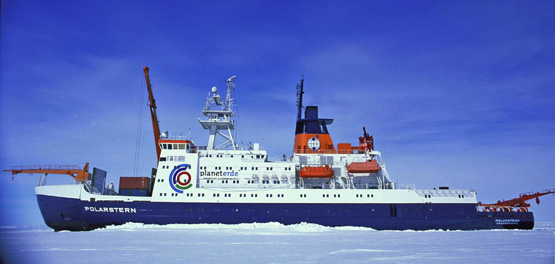
RV Polarstern (Hannes Grobe/Alfred Wegener Institute)
NoSoAT 2016 will investigate ocean, atmosphere and climate interactions on a transect from Bremerhaven to Cape Town from 12 November to 11 December 2016.
On the transect, postgraduate students will explore principles of oceanographic and atmospheric interactions and their impacts on climate. Investigations will focus on applied research techniques, supported by lectures, practical sessions and student presentations.
Participants will gain hands-on experience in the deployment and operation of scientific instrumentation, data and sample acquisition, post processing, and data analysis and interpretation.
Themes and topics for NoSoAT 2016 include:
- Oceanographic sampling and data acquisition
- Atmospheric lidar systems
- Remote sensing techniques
- Climate physics: processes and models
- Data analyses and dissemination
- Climate advocacy and governance
In 2015 eight students from universities and institutes of technology on the island of Ireland were among 32 successful applicants from 19 countries.
This is a fantastic opportunity to learn research skills in an international floating university led by leading researchers at the nexus of climate, marine and meteorological sciences and should not be missed.
Further information on NoSoAT2016 is available online HERE or by emailing [email protected]. To get on board NoSoAT 2016, please go to the online application form HERE.



























